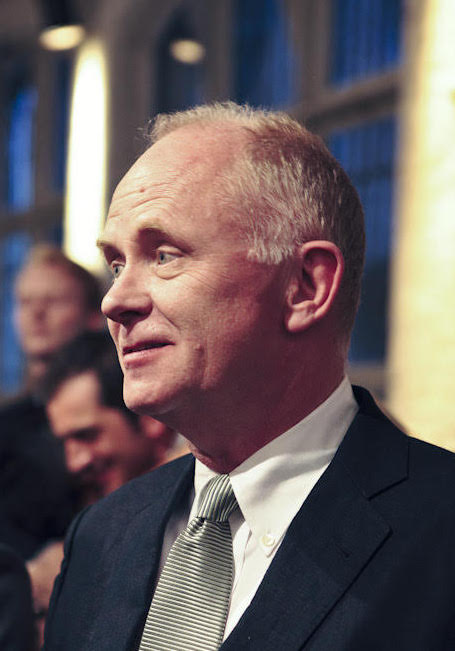 Stephen Wallace Gaukroger was born in the northern English town of Oldham on 9 July 1950. He attended the newly founded Cardinal Langley Grammar School in Middleton, Manchester and proceeded to the Birmingham College of Commerce to study librarianship. Having dropped out, he moved to London and, after a few years’ hiatus, enrolled at Birkbeck College, University of London, where he was awarded first class honours in Philosophy in 1974. He then went up to Cambridge where he gained an MA (ex officio) and PhD in History and Philosophy of Science in 1977 under the supervision of the philosopher of science Gerd Buchdahl. The Department of History and Philosophy of Science at Cambridge had only been established in 1972 and Buchdahl was its first Head. This was the heyday of HPS and Gaukroger moved quickly from a Junior Research Fellowship at Clare Hall, Cambridge (1977–78) to a research fellowship in the Department of History and Philosophy of Science at the University of Melbourne (1978–80). He was to live, work and retire in Australia for the remainder of his life, though he travelled widely and, in his later years, divided his time between Sydney and London.
Stephen Wallace Gaukroger was born in the northern English town of Oldham on 9 July 1950. He attended the newly founded Cardinal Langley Grammar School in Middleton, Manchester and proceeded to the Birmingham College of Commerce to study librarianship. Having dropped out, he moved to London and, after a few years’ hiatus, enrolled at Birkbeck College, University of London, where he was awarded first class honours in Philosophy in 1974. He then went up to Cambridge where he gained an MA (ex officio) and PhD in History and Philosophy of Science in 1977 under the supervision of the philosopher of science Gerd Buchdahl. The Department of History and Philosophy of Science at Cambridge had only been established in 1972 and Buchdahl was its first Head. This was the heyday of HPS and Gaukroger moved quickly from a Junior Research Fellowship at Clare Hall, Cambridge (1977–78) to a research fellowship in the Department of History and Philosophy of Science at the University of Melbourne (1978–80). He was to live, work and retire in Australia for the remainder of his life, though he travelled widely and, in his later years, divided his time between Sydney and London.
In 1980 he married Helen Irving (later to become Professor of Law at the University of Sydney) and the following year they moved to Sydney where he commenced a lectureship at the University of Sydney. As a result of the infamous ‘split’ in the philosophy department at Sydney in 1973, there were two departments. Gaukroger’s lectureship was in the Department of General Philosophy and he was among ‘the gang of three more’ who migrated to the Department of Traditional and Modern Philosophy in 1985. (The first ‘gang’ moved across in 1976 within three years of the split.) Promoted to full professor in 1999, it turned out that Gaukroger would play a key role in the eventual amalgamation of the two philosophy departments at Sydney.
In 2000 while acting Head of the newly created School of Philosophical and Historical Inquiry, Gaukroger helped lead a series of decisive meetings that led to the amalgamation. There were opponents of the move at the time, however, with the benefit of hindsight it proved to be a strategic initiative that unified and consolidated the discipline of philosophy within the Faculty of Arts.
In the final decade of his career, he was awarded two consecutive five-year ARC Professorial Fellowships (2004–2015) and in 2011 he moved from the Department of Philosophy to the Unit (later to become a School) for History and Philosophy of Science in the Faculty of Science. He also managed to juggle a visiting professorship at the University of Aberdeen from 2007–2013 with his commitments at the University of Sydney.
Gaukroger retired in 2014 and became Professor Emeritus that year.
His arrival in Australia was a boon for the disciplines of both history of philosophy and history and philosophy of science. Indeed, the title he chose for his chair in philosophy reflects his own awareness of his disciplinary range; he was Professor of History of Philosophy and History of Science. When his Descartes, An Intellectual Biography appeared in 1995 (Portuguese translation 1999) it propelled him to the very forefront of Cartesian studies. It was unquestionably his breakout publication, for rather than presenting Descartes as the archetypal rationalist the book took his natural philosophy seriously. This was followed by the seminal collection on Descartes’ Natural Philosophy (2000) co-edited with John Schuster and John Sutton (one of Gaukroger’s first PhD students).
Then came Descartes’ System of Natural Philosophy (2002), an introductory overview of Descartes’ ‘scientific’ thought including a beautifully clear exposition of Descartes’ vortex theory of planetary motions. These three works were neither the first, nor the last instalments he made to Cartesian scholarship: Descartes: Philosophy, Mathematics and Physics (1980), Cartesian Logic: An Essay on Descartes’ Conception of Inference (1989) and his translations of Arnauld: On True and False Ideas (1990) and Descartes: The World and Other Writings (1998) were important precursors, and three more collections on Descartes and Cartesianism were to follow. Nonetheless, the intellectual biography was the most cited work during his lifetime and helped usher in a major turn in the study of Descartes’ philosophy.
While he published around sixty journal articles or book chapters, Gaukroger’s preferred format was the book, whether authored or edited. In all he produced twenty-six books, including fourteen monographs: an extraordinary output that situates him at the forefront of his disciplines. The articles, however, are not to be ignored and of particular importance is his paper (with Schuster) on the foundational role of hydrostatics in Descartes’ dynamics (2002). Among the books it is the highly ambitious, sprawling and thoroughly engaging quartet on the theme of Science and the Shaping of Modernity that calls out for special attention. The volumes in order are: The Emergence of a Scientific Culture (2006; Chinese translation 2017), The Collapse of Mechanism and the Rise of Sensibility (2010), The Natural and the Human (2016) and Civilization and the Culture of Science (2020).
Very few scholars of modernity since the 1960s have aspired to write multi-volume macro-histories. The task seems too daunting and time too short. The focus instead has been on micro-histories, getting the details right, restricting oneself to one author or to a narrow time period or to a geographical region. Gaukroger’s quartet spans the whole of Europe and in the final volume north America. The stated aim of the series as he put it is ‘to offer a comprehensive conceptual and cultural history of how scientific values and norms came to occupy such a prominent position in Western culture’. Its chronological range is vast, commencing in 1210 and continuing to the Second World War; the degree of erudition is staggering; and the intellectual curiosity that drives the project, highly infectious. Gaukroger was a good stylist and able to keep the macro-argument moving and to the fore. We need macro-histories such as these and Gaukroger was one of the few of his generation who could rise to the challenge.
Gregarious, amiable, politically astute, and a hard worker, Gaukroger was a scholar who got things done, and those things often went well beyond the latest writing project. His contributions to his disciplines were multifarious. He served as President of the International Society of Intellectual History through a critical period from 2002–08 and, together with Stephen Clucas, turned its newsletter into a leading journal of intellectual history, the Intellectual History Review, which he co-edited from 2007–2020. In 2005 he succeeded Rod Home as the editor of the Kluwer/Springer book series Australasian Studies in History and Philosophy of Science under a plan to internationalize the series, its author pool and its editorial board with the new name Studies in History and Philosophy of Science. He carried out this strategy with his usual energy and success, passing on the editorship of the thriving series in 2019.
He also served on numerous editorial boards and held executive positions of various learned societies including President of the Australasian Society for the History of Philosophy (1993–99), President of the Australasian Association for the History, Philosophy, and Social Studies of Science (1995–97) and Chair of the Australian Academy of Science National Committee for the History and Philosophy of Science (1994–97).
In 1992 he was elected as a fellow of the Australian Academy for the Humanities. In 2003 he was awarded an Australian Centenary Medal for contributions to history of philosophy and history of science. He was elected a corresponding member of L’Académie Internationale d’Histoire des Sciences in 2007 and Membre effectif in 2017. He was elected Fellow of the Royal Society of New South Wales in 2016 and in the same year Fellow of the Royal Historical Society. In 2022 he won the History and Philosophy of Science Medal from the Royal Society of New South Wales.
Gaukroger was something of a bon vivant, a lover of fine music and fine food, and his colleagues and students certainly benefitted richly from his choice of conference venues, restaurants and his London club. However, even more, he was a great supporter and active encourager of young, emerging scholars, to the point that he would look ahead for former students and younger colleagues and help fashion their careers.
As for his cast of mind, always a strongly independent thinker, he was intellectually adventurous with an enormous range. He published on Aristotle and contemporary French philosophy, the Swiss mathematician Leonard Euler and the German thinker Johann Gottfried Herder, on the failures of philosophy and the concept of objectivity (Objectivity: A Very Short Introduction, 2012; German translation 2015). On the whole, while not a continental philosopher, Gaukroger was a critic of contemporary analytic philosophy which he regarded as inhabiting its own detached ‘quasi-Platonic realm’. Yet in his critique of the failures of philosophy as a discipline, the subject of his final monograph, his historical instincts take over as he develops three historical case studies of philosophy’s past inability to answer its own most pressing questions.
Stephen Gaukroger has left a lasting legacy in Australian intellectual life and indeed his impact has and will be felt internationally. He passed away on 3 September 2023 after a short illness and is survived by his wife Helen, their children Cressida and Hugh, and grandchildren Ottoline, Edgar and Bertie.
Professor Peter Antsey FAHA
The University of Sydney



